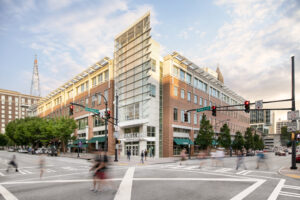When Georgia Tech President Ángel Cabrera gave the 2024 Institute Address back in September, he described Tech square as it was when he was a graduate student in the 1990s:
“A brownfield of chain-link fences, broken windows, and abandoned buildings.”
But today, Tech Square is recognized nationally as a premier innovation district, with the highest density of startups, corporate innovators, academic researchers, and students in the entire southeastern United States. That transformation is important to Cabrera. In 2020, he announced a 10-year strategic plan that focused on four “Big Bets.” One of those was to create a national hub for innovation, creativity, and entrepreneurship that would turn Atlanta into one of the top five cities for startups in the United States.
The city already has good bones for the accolade. More than 140,000 students are enrolled in colleges across the city, and over 13,000 students graduate from tech-focused programs each year, providing a large talent pool. Atlanta also has a number of corporate innovation centers, incubators, and accelerators, including Atlanta Tech Park, the Curiosity Lab, and Atlanta Tech Village, which is the largest tech entrepreneurial hub in the Southeast and the fourth largest in the country.
But despite this foundation, Atlanta has not yet gained the same traction as the other entrepreneurial hubs that exist outside of Silicon Valley. Why? According to a study done by Boston Consulting Group (BCG), the answer seems to lie with the amount of venture capital funding. In 2022, the city brought in $1.9 billion in venture capital funding, and while that may seem like a substantial number, it’s more than a 40 percent decline from 2021. The study notes that Atlanta’s funding level ranks 12th among the top 14 cities in the United States, falling short of Austin at $3.7 billion and Miami at $5.6 billion.
The Georgia Tech Foundation (GTF) is looking to change that. According to Brian Pellegrino, GTF’s chief investment officer, and Patrick Liu, managing director of private market investments, the organization has been investing in private equity since the late 1980s. It has become a core strategy, and the foundation (and therefore Georgia Tech) has benefited greatly from venture investments. Until recently, the majority of these relationships were outside the Atlanta area, mainly in Silicon Valley. But back in 2019, the foundation noticed that Tech startups, companies such as Flock Safety and Stord for example, were also having to go outside the city for funding.
“At that time, there were few local VCs seeking seed to early-stage startups in and around Georgia Tech. Therefore, companies sought to raise capital elsewhere,” Pellegrino says. “So they went to larger firms outside of Atlanta, mostly those located on the West Coast. In doing so, the local VCs lost control of the process because they never got on the cap table.”
The realization caused GTF to augment its strategy. In addition to investments out West, the organization decided to improve the entrepreneurial ecosystem in its own backyard by committing $20 million to five local venture capital firms and one direct Georgia Tech-related startup in 2020. That investment was followed by another $25-$30 million commitment in 2024, with a portion of that going to new firms that have established themselves in Atlanta. As GTF builds out this Atlanta ecosystem, it holds the firms to the same investment criteria as GTF’s larger investors, except that they must be based in Atlanta, with a focus on startups in Atlanta and the Southeast, and have a fund size of less than $100 million.
“The idea behind supporting smaller, local VCs is that we’re hoping to help them build a business,” Pellegrino says. “When they’re able to raise a $100-million-fund, they will have established themselves as a successful investor and will be more likely to raise capital outside of the Atlanta area.”
As Liu points out, GTF is in the business of generating returns to benefit Georgia Tech, so the primary goal of these investments is to do just that. But there is a secondary benefit. These investments by GTF
will hopefully help jumpstart what the BCG study refers to as the flywheel effect: additional funding means more support for startups, which hire and cultivate more talent, who then go on to create more companies and seek funding from existing sources or other successful entrepreneurs. Cities like New York, Boston, and San Francisco have well-established flywheels, and with VC funding readily available, their entrepreneurial ecosystems are self-sustaining. To create such an environment in Atlanta and become a top five city for entrepreneurs, BCG estimates that about 2,000 startups need to be launched annually. It’s a very ambitious goal, but one that will have many benefits for the city, including new job opportunities and a flourishing, resilient economy.
Megan McDougall, a private equity analyst with GTF who did much of the diligence when onboarding Atlanta VC firms, believes Atlanta is the perfect city to launch a startup.
“You’re in a city that’s rich in talent, history and diversity. The city itself is located close to the mountains and beaches with an airport that makes the city easily accessible to the rest of the world,” she says. “You can have a really nice life in Atlanta and the city itself can provide a great work-life balance while building a startup company.”
The Institute itself has also upped its game in terms of creating the perfect environment for entrepreneurs. Last year, Tech was named a top 20 school for entrepreneurship by The Princeton Review and Entrepreneur magazine. By catching successful startups that come out of these programs and building relationships as an early investor, the foundation, and thereby Georgia Tech, can reap the benefits.
“We want to make sure our talent stays in Atlanta,” Liu says. “If you look at our overall portfolio, it’s very U.S.-centric. The same philosophy applies here. If you can find opportunities within your own institution, within your own state, why wouldn’t you take advantage? It’s great for us, it’s great for the city’s ecosystem, and it’s great for the state of Georgia.”

